Closing the Book on a Career: Chamblee Bids Farewell to Beloved English Teacher
Photo courtesy of the Chamhian
Branca(top, left), explains style choices to a novice yearbook student in 2002.
March 28, 2021
After more than thirty years of teaching, Ms. Amy Branca, who spent over two decades at Chamblee, has decided to call it a career. In the beginning, though, teaching wasn’t Branca’s plan A. In fact, it wasn’t even her plan B or C.
“I was going to be a psychologist,” she said. “My mom was a high school English teacher and my dad worked for IBM. I never grew up thinking I wanted to be a teacher.”
However, telltale signs of her future career emerged long before she had chosen psychology.
“I always was a teacher, like when the neighborhood kids would come around to play, I would put them in the basement and put up the chalkboard and start teaching them stuff. So I always had it in me, but it was because I was always a leader, and I was an older kid, and I was, you know, bossy,” said Branca. “And I don’t mean that in a negative way, they just listened to me. So I always had that thing. And I had it even through high school. I used to help my friends who were not as skilled at school as I was, we would be able to spend the night and I’d help them memorize Roman history facts for Latin class. So, I was always doing it but I never thought this is what I wanted to do.”
Alas, what she thought she wanted to do was very underwhelming in college.
“When I went to college at UGA, I started in psychology, and then I ended up in this class called Psych 311, or 133, or something. And it was experimental psych, and you were supposed to have already taken stat. I think I signed up for it accidentally, I mean obviously I wasn’t ready for it, but I got in, and I was scared s—less. I had no idea what they were talking about, no idea what they were doing, you had to run your own experiments, and you had to have all this statistical analysis about p equaling less than .5, blah blah blah. And I freaked out and dropped the class, and came home crying, and had no idea what I was going to do. So then, I changed my major to archaeology,” she said. “So I had a cool archaeology class. That was stupid. I had to go on this dig in Arizona for a summer and all we found was cigarette butts and bottle caps, I’m like, ‘This is what we do? I thought we were supposed to be finding like Native American burial grounds.’ Well, this is how you get to that. So, this is a long-term commitment, for very little reward. And then, my boyfriend at the time, […] he was taking this metaphysical philosophy class. And I was like, ‘Ooh, that sounds really cool.’ And so he’d come home and talk to me about it. I’m like, ‘Oh, I want to do this.’ So then I became a philosophy major and I took metaphysics, and aesthetics, and ethics, and all this stuff.”
After three switches by her own decision, it was an ironic turn of fate that landed her in her final major, which brought her into her career.
“Then it was the end of my sophomore year, beginning of my junior year, and at that point you have to say, ‘this is my major,’ or they make you take a break until you can figure it out because […] they [didn’t] want you wasting your money. And this was before HOPE [Scholarships] and all that,” she said. “So I was going to my advisor, expecting her to say, ‘Yeah, you don’t have a major and you need to go figure out what you want to do with your life.’ But I walk in and she’s like, ‘Well, I see you’re a literature major.’ I said, ‘What?’ She goes, ‘You’re a literature major, you’ve taken nine lit classes.’ What! […] So I went, ‘Oh, I’m a lit major. Okay, great.’ And she goes, ‘So what do you do with that?’ And I went, ‘I don’t know.’ So I went home and shamefully called my mother, and she went, ‘You know what you’re going to do with that.’ I was like, ‘You can’t be right all the time!’ She goes, ‘You’re going to teach high school English, just accept it.’”
Branca did accept it and started down the path that led her to Chamblee.
“I started taking my ed classes and student taught at Clarkston [High School] in DeKalb County and I loved it, I fell in love with it immediately. It was challenging, but I also knew I was good at it. I had a presence with the kids, I could walk into the room and, you know, I didn’t have to fight with them,” she said. “And that’s how I became an English teacher. And I called my mother and said, ‘I hate it that you’re right, but here I go.’ And there I went and […] then got a job right out of college at Southwest DeKalb, worked there for eight years, and then transferred to Chamblee.”
Branca’s teaching ideology is largely focused on seeing how people are alike, trying to find how we can all relate to one another.
“My philosophy of teaching, especially English, has been twofold. Number one, I want you to know that whatever you have ever felt in your life, whatever emotion it is, somebody else has felt it, and they’ve been able to express it in a way that you may not feel you’re able to,” she said. “And the other is to realize that you are no different from anybody else, that our emotions go beyond humanity, that we only have so many, and we all experience them. Now, the causes of those emotions are very different based on your experiences. But the root of those emotions, those are similar. Those are the same. The same physiological thing happens to your body when you feel a certain emotion across the board with humanity. And if we can link in with that, it’s not about empathizing and putting yourself in somebody’s shoes, because you’ve already been in them. You’ve already felt that, you just didn’t feel it because of the same set of circumstances. You already know what loss feels like, you already know what pain feels like, you already know what rejection feels like. It’s not that you can’t relate to somebody because their experience is so different. You related to them your whole life, because it’s the only experience, the only emotions we can have. And if we can realize that we are more similar than we are different, that’s always been kind of what I’ve been trying to go towards.”
However, she does feel some regret for not focusing enough on how we are also all different.
“I’ve also realized that I didn’t do enough, that my implication that we were all the same, my implication that we all have these commonalities sometimes brushed over the reality of how hard people’s lives were because they weren’t born white,” said Branca. “And that was something I was coming to terms with having to change as a teacher, and that I hadn’t done a good job of honoring other people’s circumstances. Even though they felt the same way, the way they got to those feelings were different, and that I should have honored that more and that is something that I kind of regret, you know, kind of being forced to retire when I did that. I didn’t get to grow as a teacher. I’m growing as a person with that knowledge, but in terms of how I taught my classes, I don’t have an opportunity to show that because now I’ve retired.”
While she was at Chamblee, one of Branca’s proudest achievements was receiving the 2012 Teacher of the Year award, something she never expected to win.
“I won Teacher of the Year in 2012, and Teacher of the Year had never been anything that I really cared about getting, because it’s voted on by your colleagues, right, not by the kids,” she said. “And I am often not liked by my colleagues and because I am outspoken […] and blunt, and all of those things. And that’s just who I am. But I put people off. When I would go to the copy machine, and it would be broken because somebody had left their jammed papers in it, I would clear the paper out, look at the name and who was running the copies and go open their door and throw it in their doorway, because I was so pissed off. So yes, I was a bit of a b—-. […] So, when I won Teacher of the Year, voted on by my colleagues, I was shocked, absolutely shocked.”
After she found out about her victory, Branca celebrated in a special way: with her students.
“They let people know [the Teacher of the Year] during October, and it happened to be homecoming week, and Wednesday was fictional character day. So I dressed up as Raggedy Ann because I had a Halloween costume of that. And then we had a faculty meeting and it was when I was dressed as Raggedy Ann that they announced that I was Teacher of the Year and took all of these pictures and I’m like, ‘Oh my god, I’ve got my hair in ponytails, I look like Raggedy Ann, this is ridiculous!’ And then, after the meeting, we were having a yearbook thing in my room, so I walked back in there and they had already been told that I had won and they decorated my room, and brought in a cake, and everything, so that my yearbook kids can celebrate with me […]. And that is probably my favorite memory, them not being in with all the adults and everything, but deciding that they wanted some time just with me to celebrate my win.”
The Chamblee yearbook class is one of Branca’s most enduring legacies, as she helmed the annual “Chamhian” from her arrival at CCHS until her retirement this year.
“[The] yearbook is meant to be a promotional, [to] give people the best memories of their high school that you can, because the bad ones are already in their head. So we have done stories about teenage pregnancy or about homelessness, but we usually do it in a way that people are being successful and thriving,” said Branca. “So, our whole mission is to uplift.”
Branca takes extreme pride in the “Chamhian,” says yearbook editor-in-chief Claire Turney (‘21).
“She took yearbook very seriously. She took a lot of pride in the yearbook, and she definitely instilled in us what an accomplishment it was to work on such an esteemed book that she had been like building up for 20 years, and she was like, ‘We are better than all the other books,’ it was kind of vanity, but I think it was well deserved. I mean, we have a really bomb book, in case you’re wondering. So she definitely tried to make us feel proud,” said Turney.
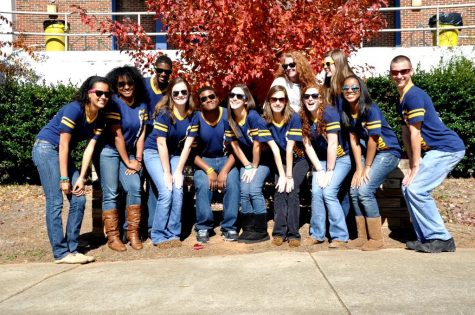
In terms of teaching yearbook itself, Branca generally took a hands-off approach with most of the class.
“For yearbook, it was kind of self-run, in that she didn’t have to give us instructions every day, we just kind of went to our sections and the editors assigned work, and we went through the day like that and then on Fridays, we had our editors meetings to debrief,” said Turney. “The editors grade the staffers, and then the editor-in-chief grades the editors, and then Branca grades the editor-in-chief. So there’s a definite power structure there, that Branca doesn’t always communicate with the staffers. In fact, she kind of set it up in an intimidation model, so that if you ended up going to Branca and you were a staffer, something was wrong, she was about to tell you off. She was like, ‘I am the last resort.’ So her teaching methods were different than most classes I’ve had, in that she actively understood that her role as teacher was like, intimidator. She was the final person if your staffer wasn’t doing something right. She was like the final boss that they had to interact with and ultimately, Branca motivated by fear. And then once you became an editor you realized it wasn’t fear, it was all just a giant scheme, it was a lie. She was actually very nice, and just wants to support us.”
The yearbook staff also often enjoyed celebrations and traditions in their class.
“[Branca] definitely was a big fan of us celebrating the work that we put in,” said sports editor Mary Adam (‘21). “So, we would have little buffets and parties every once in a while and she always makes the best food.”
Abby Starr (‘21), the yearbook’s photo editor, talked about one of her favorite yearbook traditions.
“I think one of my favorite yearbook traditions that we did was the Festivus, which I think she said is from Seinfeld, and they’ve been doing it for like fifteen to twenty years,” said Starr. “Every year instead of doing Secret Santa, we would do Festivus, where you get a Festivus buddy, and then every Friday you bring them a small gift leading up to Christmas, and then on the last Friday before we get out for Christmas break you bring them a bigger gift. And so every Friday you get an anonymous gift from someone, and on the last day you find out who it is and […] that’s kind of what we do in place of the final exam. I mean it was just a really fun tradition, it was cool to be a part of yearbook, it just has a lot of fun traditions like that. Ms. Branca just makes it a very fun, community class.”
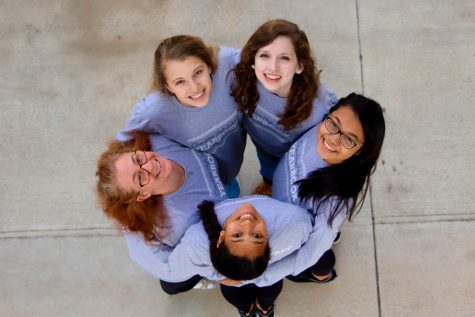
Yearbook wasn’t all fun and games, though, and could be intimidating at first.
“The first day in yearbook is crazy,” said Turney. “I remember it was my very first day, I’m a little sophomore, and she’s like, ‘The first day only happens once,’ and everyone just runs out into the hallway with their cameras and is going around to the lunchroom, to the cafeteria, to random classrooms, taking pictures and interviewing people, and on your first day on the yearbook staff, you’re like, ‘I don’t know what I’m doing.’ It’s a very trial by fire method. And she totally believed in that. You just gotta […] throw the bird out of the nest and try.”
Soon after she started, though, Branca made a fateful prediction about Turney’s future.
“When I was a sophomore, she came up to the sports section, […] which is the section I was in, and she said, ‘You’re going to be editor in chief,’” Turney said. “I was like, ‘Ha ha.’ She was like, ‘No, I mean it, when you’re a senior, you’re going to be editor in chief.’ It was like three weeks into school, I had no idea how she had figured that out already, but I mean it happened.”
Branca also convinced Starr to stay on the yearbook staff after she began having doubts about taking the class another year.
“[Yearbook] was definitely more of an extroverted kind of class than I was expecting. So I remember halfway through the year, I was kind of like, ‘I’m not sure I want to come back to yearbook next year, I’m not sure if it’s the right class for me,’” said Starr. “Ms. Branca was super nice and understanding about it, and she took me aside and was like, ‘You know, I really like you, I think you’re a good person for yearbook and I want to make sure you’re comfortable and we can find a role that you’ll like.’ So she was super super sweet and super nice about it.”
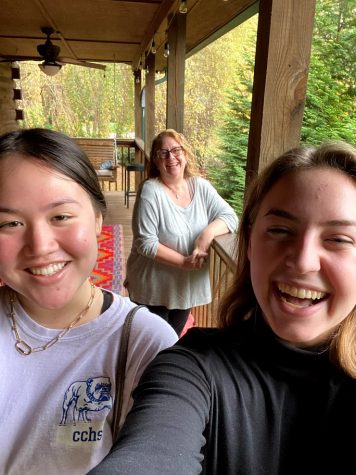
For this year’s edition, Branca was forced to be even more hands-off, due to the COVID-19 pandemic and virtual learning, but is incredibly proud of her students for how hard they’ve worked.
“[This year’s yearbook is] so good. Now, are we missing things? Of course we are. Can we be there to photograph everything? Of course we can’t. But this is really good. It’s good. And that is what makes me happy, that these kids take ownership. The best thing about being the yearbook sponsor, and I haven’t been able to do this, […] but this yearbook is not mine at all. Not the design, not the theme, not the colors, nothing. This is the first year I haven’t made a single decision,” said Branca. “It is so easy and comfortable because I know, [all of the yearbook staff] are killing it. It’s hard for me to let the babies fly out of the nest, and it is so great. I used to think I had to do more. I wasn’t able to do more. It is amazing. It’s humbling for me to imagine and for me to realize, I understand that they would not work that hard if the expectation that I had for them were not high, I understand that, but them living up to that expectation without me even having to give them direction, that is amazing, and almost incomprehensible to me how good they are. Those are my favorite moments, when I see that they have designed something and finished a page, and they send it to me and they’re like, ‘What do you think?’ and I’m like, ‘It’s perfect. What do you mean, ‘What do I think?’’ […] When the students surpass the teacher, those are my favorite moments in yearbook.”
The COVID-19 pandemic and the virtual learning that ensued was a curse, but also in some ways a blessing for Branca.
“Last year was my 30th year,” she said. “So I could retire with full benefits in DeKalb County. […] We did the end of last year virtually, and I hated it, but I already knew my kids, so I still know you, we’re just distant. When we started this year, never meeting them [was hard]. Like, I don’t even know my yearbook kids. I’m still the yearbook advisor, Ms. Andriano has taken over officially, but I’m still proofing the pages and being in class with those kids until this is done, because that’s not fair to them. […] So I went out to California to visit my brother this summer. He lives out there. And I’m like, ‘I think I can do this. I kind of figured out the online stuff, from March to June. I can do it.’ And so I went ahead and kept teaching and school started, and my husband and I were looking at property, we were looking at moving out of Atlanta. […] I ended up in the mountains, which is where I wanted. And we were looking at properties, and we found something that I fell in love with, my spirit fell in love with, my husband’s spirit fell in love with, and I said, ‘Okay, this isn’t going to come up very often. The market is great right now. Let’s go ahead and buy it and move. And as long as we’re teaching online, I can continue to teach. And as soon as we have to go back in person, then that will be the sign from the universe, it is time for me to go ahead and retire.’”
Like all of us, the past year has forced her to be more flexible with her plans. Surrendering to the universe has been difficult, but worth it.
“You know, if COVID have hadn’t happened, I would still be teaching. I will promise you that. I was really scared to quit. I was really scared to retire because it’s all I’ve ever done since I was 21, I had no idea what was next. I still don’t, by the way. But I would have kept doing this, and I wouldn’t have moved.” said Branca. “So, I mean, for me, I feel guilty sometimes because this whole isolation thing and this whole COVID thing has actually brought me to a different place, which is better. It gave me strength to do something instead of being stuck in what the status quo was because the status quo changed so much. Everything was changing. I was like, ‘Well, let’s just keep going.’ So we moved up here in September of 2020, and I was continuing to teach, and then we got an email from the county in October saying that we needed to tell them whether we were planning on returning when it was safe or whether we were not. And I knew that I now live in Rabun County, Georgia, I am two hours away from Chamblee. So I knew I wasn’t returning. There’s no way […]. I went ahead and told them that I would not be coming back, and then that started my retirement paperwork. My last official day of teaching was October 16, 2020.”
Branca is fully enjoying her retirement.
“I am sitting on my deck, […] and I’m enjoying the trees dancing, and my dog, and I just had five deer walk past about an hour ago. This is exactly what I envisioned it to be, I am in no hurry to do anything else,” said Branca. “I gave thirty-something years of my life to education. And I loved every minute of it. And it wasn’t until I retired that I realized how much of my daily life outside of teaching was spent thinking about the kids I taught. Not just thinking about them, trying to make their lives better, calling their parents, trying to find help for food insecurity, and it just is so much more than teaching, if you’re doing it right. It’s so much more than teaching, and it sucks the life out of you. […But] I am selfish now. I want things that are for me. And I feel guilty about that sometimes, and maybe that will change, maybe in a couple of years I’ll get bored, and I’ll be ready to get back in there. Right now, this is all I want to do, […] sit outside with my dog, do some paint by numbers, watch some TV. Seriously. It is really fine, and not just fine, it’s really great. […] I always had this thing hanging over my head, like I have to get this thing done by this date. I don’t have that. I don’t have that at all.[…] I have never had this in my life. And the freedom is intoxicating.”

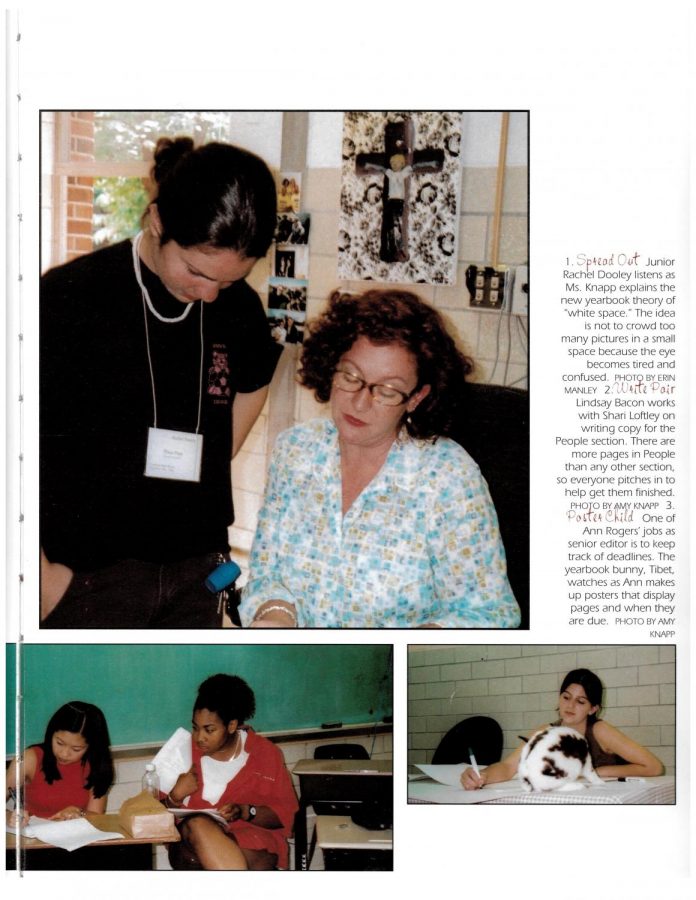
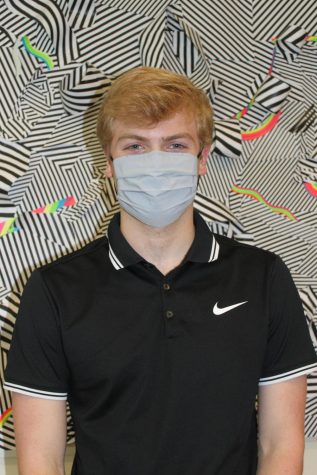









Sharon Tyroff • Mar 28, 2021 at 3:52 pm
Congratulations on what sounds like a job very well done !! I am sure you will never know all the lives you have impacted in a positive way ! Enjoy your retirement, hubby and fur babies .